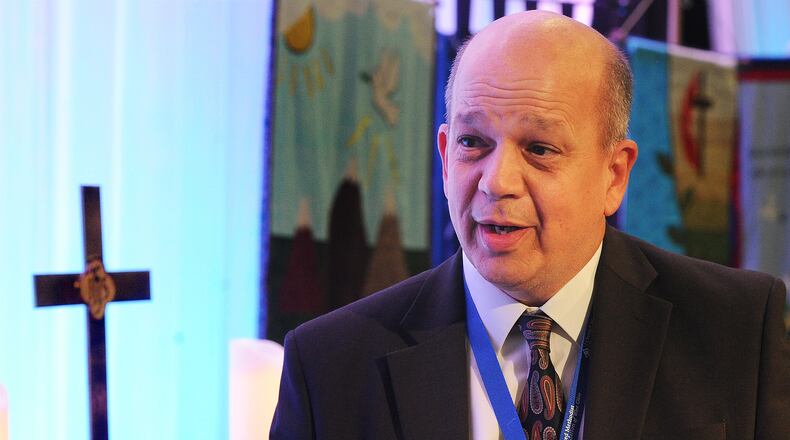Among the church policies to be voted on over the course of the summit, the conference voted Thursday afternoon to allow disaffiliation for 172 congregations, of about 961 congregations in Western Ohio. Another 80 disaffiliated last year.
“I am always saddened by any person or congregation believing they need to sever their relationship with the United Methodist Church. However, I honor their right to choose what they believe is the best path for them to serve Jesus Christ,” said Bishop Gregory Palmer, the episcopal leader of the Western Ohio Conference.
“I bid the 172 churches that have departed our communion the best. My focus will continue to be on a vibrant future for the West Ohio Conference of The United Methodist Church and its more than 700 churches. To the extent we focus on the mission God has given us, that future is assured,” he said.
Around 75% of congregations in the Western Ohio Conference, which encompasses most of Western Ohio, chose to stay with the faith.
The tone was emotional Thursday afternoon, as the conference voted to allow those churches to leave the UMC, according to those in attendance.
“We’re working on it as the body of Christ. By its mere definition we’re one in the name of Jesus. And whenever that one body is divided, it’s stressful. It’s sad,” said Jim Wilson, superintendent of the Miami Valley district of the UMC. “We’re just trying to do it with transparency, with integrity, with honesty, and when a church makes a decision, we wish them well.”
The United Methodist Church has been undergoing a slow schism over the course of the last few years. This year is likely to see “the peak” of church disaffiliations, according to the United Methodist News service, under a church law that allows congregations to leave the UMC if they meet certain conditions, including a two-thirds majority vote of the members of the congregation. That law is set to expire at the end of 2023.
So far, annual conferences have approved 3,838 disaffiliations, or about 12.5% of U.S. congregations since the rule took effect in 2019, according to the news service. There are an estimated 30,000 congregations in the U.S., with nearly 13,000 more around the world, according to church statistics.
The most highly publicized flashpoint in the theological debate is over LGBTQ issues and the role of queer clergy. Some progressive churches have defied Methodist doctrine, which bans same-sex marriage and the ordination of openly gay clergy, by adopting more LGBT-inclusive practices.
Many of the departing churches are joining the conservative Global Methodist Church, created last year. Other congregations have chosen to remain independent or join different denominations. Global Methodist Church doctrine states that human sexuality “is a gift of God” and should be exercised as “a loving and monogamous marriage between one man and one woman.”
But some departing Methodists say the divide runs deeper than a single issue.
Divisions over LGBT people are “the symptom of a theological divide within the denomination,” said Brian Straub is an ordained pastor in the Global Methodist Church. “We all believe that gay people are worthy of Christian love. We don’t agree on how to do that.”
Straub is President of the West Ohio Wesleyan Covenant Association, which helps Ohio churches who wish to disaffiliate with the UMC through the process.
Traditional theology, Straub said, says the Church exists to bring salvation to all people. The United Methodist Church’s official mission statement is “to make disciples of Jesus Christ for the transformation of the world.”
Kenneth Stewart, pastor for Ware’s Chapel in West Manchester in Preble County said the change has “opened up a conversation” in his congregation about what that mission means in today’s world.
“It’s been a really taxing emotionally,” he said. “This issue has torn relationships apart, torn churches apart.”
“The world needs good news, the world needs joy, the world needs a place to belong,” he said.
Stewart said sexual orientation wasn’t the focus of discussion for the Ware’s Chapel congregation, as one social issue does not change the overarching mission of the church.
“We have parishioners who have sons and daughters who are part of the LGBT community, and they have felt the weight of exclusivity,” he said. They want their church to be a place for their family. We all have jobs to do, and that is to be a light to the world.”
In order to disaffiliate, the church goes through a process of prayer and discernment. The church then holds a conference, where all members of the church have a vote, and require a two-thirds majority to start the disaffiliation process.
Then annual conference has to vote to release them, which happened Thursday.
Any church in Western Ohio must pay the previous year’s apportionments, or denominational expenses, in full, along with the full apportionments for the coming year. The church must also pay unfunded pension liability for previous pastors.
Once that happens, the conference releases the congregation from its “trust clause,” a rule dating back to denomination founder John Wesley, which states the church building legally belongs to the conference. The church is then free to disaffiliate with its property intact.
Straub said the process has been relatively painless compared to other parts of the country.
“I really thank Bishop Palmer for his leadership,” Straub said. “Those of us in the Global Methodist Church will continue to lift up our brothers and sisters who are remaining in the United Methodist Church in our prayers. And we pray for God’s blessing upon them.”
“I’m excited for the future, happy that this page can hopefully be turned, and to those disaffiliating, God be with you,” Stewart said. “We only want good to come of this, and hopefully there will be unity and healing.”
About the Author


